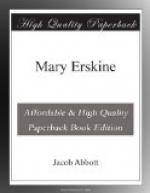Accordingly, as soon as he had passed the house where Phonny lived, which was the last house in that direction for some distance, he looked round in order to be sure that his father was not by any accident behind him, and then climbing up first upon his knees, and afterward upon his feet, he drew up the reins cautiously, and then chirruped to the horse to go on. The horse began to move slowly along. Jemmy was surprised and delighted to find how firm his footing was on the broad surface of the bags. Growing more and more bold and confident as he became accustomed to his situation, he began presently to dance about, or rather to perform certain awkward antics, which he considered dancing, looking round continually, with a mingled expression of guilt, pleasure, and fear, in his countenance, in order to be sure that his father was not coming. Finally, he undertook to make his horse trot a little. The horse, however, by this time, began to grow somewhat impatient at the unusual sensations which he experienced—the weight of the rider being concentrated upon one single point, directly on his back, and resting very unsteadily and interruptedly there,—and the bridle-reins passing up almost perpendicularly into the air, instead of declining backwards, as they ought to do in any proper position of the horseman. He began to trot forward faster and faster. Jemmy soon found that it would be prudent to restrain him, but in his upright position, he had no control over the horse by pulling the reins. He only pulled the horse’s head upwards, and made him more uneasy and impatient than before. He then attempted to get down into a sitting posture again, but in doing so, he fell off upon the hard road and sprained his ankle. The horse trotted rapidly on, until the bags fell off, first one and then the other. Finding himself thus wholly at liberty, he stopped and began to eat the grass at the road-side, wholly unconcerned at the mischief that had been done.
Jemmy’s distress was owing much more to his alarm and his sense of guilt, than to the actual pain of the injury which he had suffered. He was, however, entirely disabled by the sprain.
“It is rather a hard case,” said Beechnut, “no doubt, but never mind it, Jemmy. A man may break his leg, and yet live to dance many a hornpipe afterwards. You’ll get over all this and laugh about it one day. Come, I’ll carry you home in my wagon.”
“But I am afraid to go home,” said Jemmy.
“What are you afraid of?” asked Beechnut.
“Of my father,” said Jemmy.
“Oh no,” said Beechnut. “The horse is not hurt, and as for the grist I’ll carry it to mill with mine. So there is no harm done. Come, let me put you into the wagon.”
“Yes,” said Phonny, “and I will go and catch the horse.”




